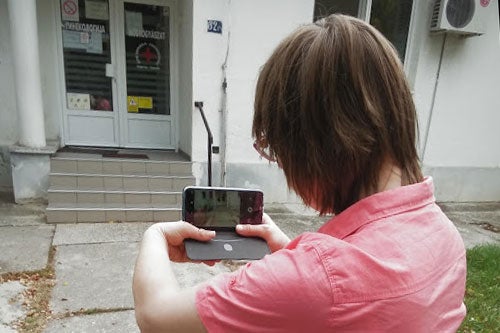News
Serbian women with disabilities shatter taboos, transform health services amid pandemic
- 12 April 2021
News
BELGRADE, Serbia – Mónika Zsúnyi, 26, can do many extraordinary things. Living in Temerin, Serbia, she has an advanced degree in applied mathematics and spends her time doing 3D modelling. She is an avid reader and community organizer. She is also – like more than a billion people around the world – living with a disability.
“I am a woman with a disability,” Ms. Zsúnyi told UNFPA. “I live with cerebral palsy. I have difficulty speaking and moving.”
This fact does nothing to diminish the richness of her life and relationships; it is time for health services to reflect this reality, she asserts.
“I try to be as independent as possible and live a full life. Sexual life is part of that,” she said.
Today Ms. Zsúnyi and other women with disabilities in Serbia are leading efforts to make sexual and reproductive health services more accessible and equitable.

In Serbia, an estimated 8 per cent of the total population — nearly 600,000 people, the majority of them women and girls — lives with some kind of disability. Yet one in five women and adolescent girls with a disability says she has difficulty accessing needed health services, according to a study carried out by UNFPA and local partner Iz Kruga Vojvodina.
One in four is unsatisfied with the sexual and reproductive health services she receives, the study found, and one in seven has never had a gynaecological examination. Only one in four says she can freely and independently decide if she wants children, or have her family’s support with this decision.
These challenges arise from the persistently negative stereotypes faced by persons with disabilities, found even among health professionals. As a result, persons with disabilities are extremely vulnerable, both to neglect and to exploitation: Globally, even before the pandemic, they were three times more likely than their non-disabled peers to experience physical, sexual or emotional violence. And with the COVID-19 pandemic raising health service and social support barriers for everyone, persons with disabilities are at risk of falling even further behind.
But women like Ms. Zsúnyi are determined to turn the tide. She joined a project launched last year by UNFPA and Iz Kruga Vojvodina to empower persons with disabilities to demand their sexual and reproductive health and rights.
Active across five municipalities — Raska, Temerin, Uzice, Valjevo and Vranje — the project provided trainings about sexual and reproductive health and rights, accessibility of health services, including gynaecological care, and skills in documenting and mapping barriers, public advocacy and creating an advocacy action plan.
“Due to the COVID-19 pandemic we implemented almost the whole project online,” Ms. Zsúnyi said. She ended up making a short film on the issues uncovered in the mapping exercise, which was screened at the local Youth Club and inspired dialogue with local government and civil society organizations.
Other advocates, like Ana Djokic from Uzice and Marija Sofranac from Valjevo, became vocal advocates for destigmatizing the sexual and reproductive health needs of women with disabilities — a topic long considered taboo.
“Many people think that women like us, women in wheelchairs, cannot become wives or mothers,” Ms. Sofranac said. “We hardly ever get that chance.”
Advocates are also working with local health officials to make doctors’ offices more physically accessible. In Raska, Dusica Stretenovic convinced local authorities to support the acquisition of a hydraulic examination table. “I have the right to ask for equal treatment regarding sexual and reproductive health, and the state is obliged to support me in this,” she said firmly.
In Vranje, Gordana Stojanovic persuaded officials to put a disused hydraulic table back in service for gynaecological check-ups. She also made a film about the challenges facing women with disabilities in the municipality, and helped pass a local memorandum to prioritize the needs of her community.
“Women with disabilities often feel like second-class citizens, of no use to the community,” Ms. Stojanovic. She and her fellow advocates are done with those tired stereotypes. Today, they have the skills, experience and confidence to continue fighting for a more inclusive world.
“These activities pushed me out of my comfort zone a bit, and broke down the prejudices I had about myself – that I am not capable of being a leader due to my difficulty in speaking,” said Ms. Zsúnyi. “Our life is not always easy, but it is always worth fighting for our rights.”